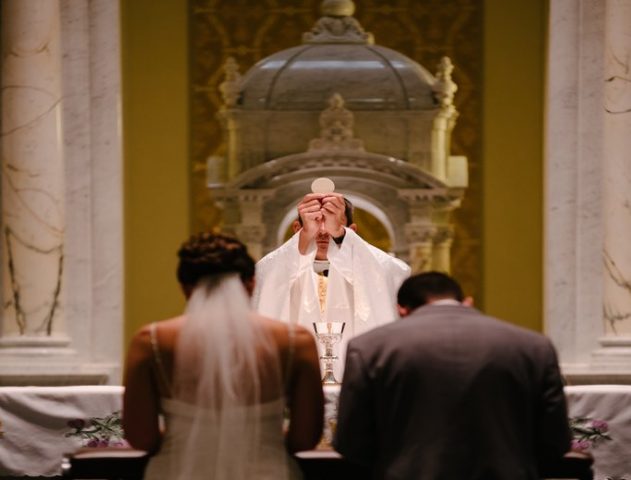By Father Brian Mullady, OP, EWTN News, 6/23/17
In the film The Nun’s Story, produced in the late 1950s, just before the vocation crisis that has so struck the Church in the last 50 years, the postulants enter the chapter room to be received into the religious community.
Mother Superior gives them a talk about the demands of the religious life. The original script read: “Chastity is against nature.” The priest who was the technical adviser objected that it was not against nature, but above nature. He could only convince the producers to alter the script to say that “in a sense” it is a life against nature.
The debate over the unnatural character of virginity and chastity also characterizes the debate over priestly celibacy, which has taken place in the Church for the last 50 years. In the years after the Second Vatican Council, many priests who left the priesthood sympathized with one who said: “Without a woman, I am only half a man.”
The traditional discipline of the Latin Church requiring priestly celibacy has been disputed in the long history of the Church, but perhaps never more than since the Council (1962-1965).
Indeed, Pope Blessed Paul VI took up the question specifically in an encyclical whose 50th anniversary is this year, Sacerdotalis Caelibatus (The Celibacy of the Priest), which was proclaimed June 24, 1967.
The questions and answers of Paul VI were made more complete in the teaching of Pope St. John Paul II, but sadly have come up recently for another new debate. Clarification is needed, then, as to why the Latin Church requires celibacy, and while it is not a doctrine, it is certainly a long-standing Church tradition and discipline for a reason.
The two great arguments against the continuance of the requirement for priestly celibacy are that it exacerbates the vocation crisis and is against nature. As to the first, this argument is a red herring. The Church has never had sufficient clergy to staff its parishes, even in those Eastern Churches that allow married clergy.
Pope Paul basically dispatches the first contrary argument back in 1967 by saying: “We are not easily led to believe that the abolition of ecclesiastical celibacy would considerably increase the number of priestly vocations. The contemporary experience of those Churches and ecclesial communities which allow their ministers to marry seems to prove the contrary” (49).
He also observes the lack of catechesis and understanding of the role of grace in salvation and relation to nature as a further cause. One could also add today that, in former times, Catholics had very large families. Today in Western culture, at least, this is not normally the case. Thus even the pool of possible candidates for the priesthood is greatly diminished.
The second argument is a more difficult one.
Some consider the practice of celibacy to be a denigration in some way of marriage and sexuality. This would lead to a life in which a man denies his legitimate nature.
Since the Church has always been clear that neither is evil and that both are good, this would also suggest that a man who embraces celibacy would be less masculine or less integrated than one who married. Many also think that the celibate priest becomes so removed from the world that he cannot understand the problems of married couples or help them. This is a pastoral argument.
Finally, in some Church quarters, the teaching on the nature of the Eucharist has become so compromised that it is looked upon as a mere dramatic re-enactment of the Last Supper. A married man could certainly do this as well as a celibate one, so why require celibacy?
Further complicating the matter is the traditional interpretation of the history of celibate clergy. This history normally states that priests could be either married or celibate from the time of the apostles, although celibacy was recommended, and in the ninth century the Latin Church decided to make celibacy mandatory because of the sexual promiscuity of the clergy. The actual history is a bit different.
Though it is true that from the time of the apostles priests could be married or celibate, once a priest was ordained he and his wife had to make a promise of perpetual continence. They had to renounce marital relations.
In 692, in the Quinsext Council of Trullo, a local council, the Eastern Church at Constantinople decided to forgo this requirement and allow married priests to have relations with their wives, though they sought to make a nod to the previous practice in several ways.
First, a priest who had relations with his wife could not celebrate the Eucharist the day after, which put an end to daily Eucharist in the Eastern Church. Also, since bishops have the fullness of the priestly character, only priests who were celibate could become bishops, which is contrary to the normal discipline in which religious should be bishops by way of exception.
The Latin Church in the ninth century made celibacy mandatory to preserve the morals of the clergy and to save the wives of priests from having to renounce relations. What was the connection between the renunciation of marriage and the celebration of the Eucharist?
As Paul VI observed, it is many layered. The most important reason to encourage celibacy is that it expresses the complete identification of the human priest with Christ, who himself was not married and had no children of his body. This identification is important because the primary priest at each Mass is Christ. The ministerial priest celebrates in persona Christ capitis (in the person of Christ), not in his own person.
In the celebration of the other sacraments, the personality of the priest enters. In fact, the word “I” is used to express this personal participation. “I baptize you,” “I absolve you,” and “I anoint you” are used in the other sacraments.
But in the Mass, the priest merely repeats the words of Christ. He does not act in the person of the name on his passport, but only in the person of Christ because of the mystery of transubstantiation. The miraculous change of the bread and wine in the Eucharist demands this complete identification, which includes all his powers.
This change is the miracle of miracles.
Since it is a heavenly mystery of grace (the risen body of the Savior becomes present on the altar), the ego of the human priest must disappear and be self-completely absorbed in the Person of Jesus. This includes the powers of the soul that revolve around sexuality.
This is not because there is some judgment made that the body and sexuality are in any sense evil, but as Pope Paul pointed out, it is related to the words of Christ that in heaven: “They neither marry nor are given in marriage” (Matthew 22:30).
Nor does this involve a renunciation of masculinity or fatherhood. Rather, the priest embraces spousal love with all that entails for the whole body of Christ, which is especially manifested in his care of souls. He must be more masculine in defending all his people from error and sin.
This calls for him to address these weaknesses also in himself. This also demands great maturity and proper human formation. It is interesting that a famous 19th-century German psychiatrist, Richard Kraft-Ebing, hardly a friend of the Catholic Church, once observed: “The fact that the Catholic Church enjoins celibacy upon its priests, in order to emancipate them from sensuality and preserve them entirely for the purpose of their calling, is an example of a discerning psychological knowledge of mankind” (Psychopathia Sexualis, 14), though he also observed that they lost the elevating effect of marriage and love.
For Paul VI and the Church in general, the discipline of celibacy, though not absolutely necessary for orders, is a marvelous and most-fitting expression of the plunging of the priestly soul into the mystery of Christ, and so could not in any sense be unnatural. It is in every sense above nature.
The priest’s heart “gives the priest a limitless horizon, deepens and gives breadth to his sense of responsibility — the mark of mature personality — and inculcates in him, as a sign of a higher and greater fatherhood, a generosity and refinement of heart which offer a superlative enrichment” (56).
Dominican Father Brian Mullady is a mission preacher and
adjunct professor at Holy Apostles Seminary in Cromwell, Connecticut.







